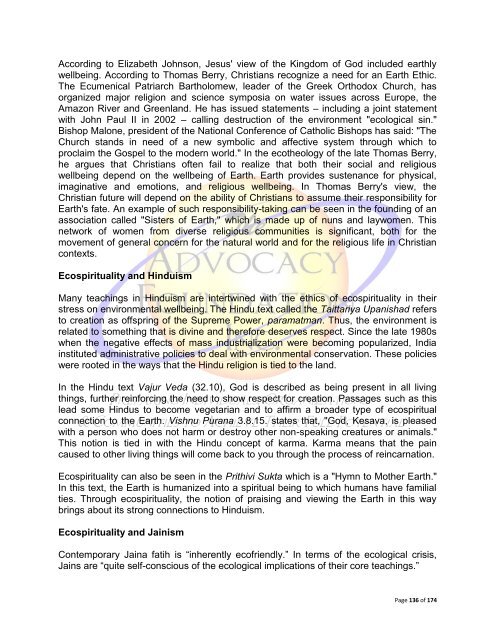The Gift of Spirituality
The Gift of Spirituality
The Gift of Spirituality
Create successful ePaper yourself
Turn your PDF publications into a flip-book with our unique Google optimized e-Paper software.
According to Elizabeth Johnson, Jesus' view <strong>of</strong> the Kingdom <strong>of</strong> God included earthly<br />
wellbeing. According to Thomas Berry, Christians recognize a need for an Earth Ethic.<br />
<strong>The</strong> Ecumenical Patriarch Bartholomew, leader <strong>of</strong> the Greek Orthodox Church, has<br />
organized major religion and science symposia on water issues across Europe, the<br />
Amazon River and Greenland. He has issued statements – including a joint statement<br />
with John Paul II in 2002 – calling destruction <strong>of</strong> the environment "ecological sin."<br />
Bishop Malone, president <strong>of</strong> the National Conference <strong>of</strong> Catholic Bishops has said: "<strong>The</strong><br />
Church stands in need <strong>of</strong> a new symbolic and affective system through which to<br />
proclaim the Gospel to the modern world." In the ecotheology <strong>of</strong> the late Thomas Berry,<br />
he argues that Christians <strong>of</strong>ten fail to realize that both their social and religious<br />
wellbeing depend on the wellbeing <strong>of</strong> Earth. Earth provides sustenance for physical,<br />
imaginative and emotions, and religious wellbeing. In Thomas Berry's view, the<br />
Christian future will depend on the ability <strong>of</strong> Christians to assume their responsibility for<br />
Earth's fate. An example <strong>of</strong> such responsibility-taking can be seen in the founding <strong>of</strong> an<br />
association called "Sisters <strong>of</strong> Earth," which is made up <strong>of</strong> nuns and laywomen. This<br />
network <strong>of</strong> women from diverse religious communities is significant, both for the<br />
movement <strong>of</strong> general concern for the natural world and for the religious life in Christian<br />
contexts.<br />
Ecospirituality and Hinduism<br />
Many teachings in Hinduism are intertwined with the ethics <strong>of</strong> ecospirituality in their<br />
stress on environmental wellbeing. <strong>The</strong> Hindu text called the Taittariya Upanishad refers<br />
to creation as <strong>of</strong>fspring <strong>of</strong> the Supreme Power, paramatman. Thus, the environment is<br />
related to something that is divine and therefore deserves respect. Since the late 1980s<br />
when the negative effects <strong>of</strong> mass industrialization were becoming popularized, India<br />
instituted administrative policies to deal with environmental conservation. <strong>The</strong>se policies<br />
were rooted in the ways that the Hindu religion is tied to the land.<br />
In the Hindu text Vajur Veda (32.10), God is described as being present in all living<br />
things, further reinforcing the need to show respect for creation. Passages such as this<br />
lead some Hindus to become vegetarian and to affirm a broader type <strong>of</strong> ecospiritual<br />
connection to the Earth. Vishnu Purana 3.8.15. states that, "God, Kesava, is pleased<br />
with a person who does not harm or destroy other non-speaking creatures or animals."<br />
This notion is tied in with the Hindu concept <strong>of</strong> karma. Karma means that the pain<br />
caused to other living things will come back to you through the process <strong>of</strong> reincarnation.<br />
Ecospirituality can also be seen in the Prithivi Sukta which is a "Hymn to Mother Earth."<br />
In this text, the Earth is humanized into a spiritual being to which humans have familial<br />
ties. Through ecospirituality, the notion <strong>of</strong> praising and viewing the Earth in this way<br />
brings about its strong connections to Hinduism.<br />
Ecospirituality and Jainism<br />
Contemporary Jaina fatih is “inherently ec<strong>of</strong>riendly.” In terms <strong>of</strong> the ecological crisis,<br />
Jains are “quite self-conscious <strong>of</strong> the ecological implications <strong>of</strong> their core teachings.”<br />
Page 136 <strong>of</strong> 174

















